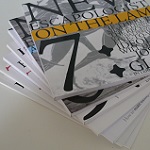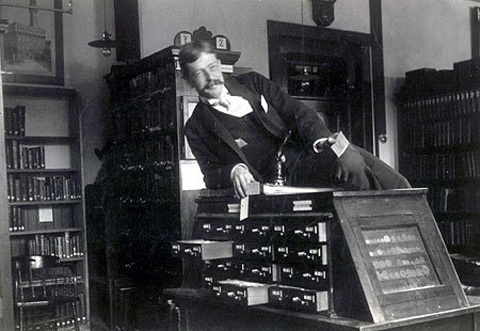Issues 1-7 Bundle
 Issues 1-7. A bundle containing our first seven issues in print. Featuring minimalism, Houdini, Leo Babauta, Bohemianism, Alain de Botton, Sartre, Joshua Glenn. Seven issues, 567 pages. £35 / €44 / US$56 / C$63
Issues 1-7. A bundle containing our first seven issues in print. Featuring minimalism, Houdini, Leo Babauta, Bohemianism, Alain de Botton, Sartre, Joshua Glenn. Seven issues, 567 pages. £35 / €44 / US$56 / C$63
Wildean Escapology

It is to be regretted that a portion of our community should be practically in slavery, but to propose to solve the problem by enslaving the entire community is childish. Every man must be left quite free to choose his own work. No form of compulsion must be exercised over him. If there is, his work will not be good for him, will not be good in itself, and will not be good for others. And by work I simply mean activity of any kind.
It’s Oscar Wilde’s birthday. Three cheers for the birthday boy!
The Soul of Man Under Socialism is a sacred text of Escapology.
We should be able, Wilde says, to spend our time precisely as we’d like to, slave to no duty or demand from others; and that the best way for society to cater for this is through a kind of non-authoritarian Socialism. In the meantime, of course, there are individual acts of Escapology–freeing ourselves from the grip of the system through clever individualist means–but that we’re brought to this is something of an indictment.
Wilde also uses the word “escape” a bewildering number of times in the essay. It’s quite uncanny. “Scarcely anyone escapes,” he says in his opening paragraph; artists of means are able to escape; Byron and Shelley escaped oppressive England for bohemian Rome.
Socialism would relieve us from that sordid necessity of living for others which, in the present condition of things, presses so hardly upon almost everybody. In fact, scarcely anyone at all escapes.
We should be free to work as cottage industrialists, to put ourselves into our art or science or craft:
One’s regret is that society should be constructed on such a basis that man has been forced into a groove in which he cannot freely develop what is wonderful, and fascinating, and delightful in him – in which, in fact, he misses the true pleasure and joy of living. He is also, under existing conditions, very insecure.
Minimalism comes up in the form of Wilde’s argument against private property. Not that it’s immoral per se but that it’s a pain in the arse.
The possession of private property is very often extremely demoralising, and that is, of course, one of the reasons why Socialism wants to get rid of the institution. In fact, property is really a nuisance.
I especially approve of this part about rebellion. Rebellion is not a thing to be enjoyed for it’s own sake, no matter what the punks might think. What great things might have been accomplished by, say, Tony Benn or Che Guevara or Richard Dawkins if they had not been required to spend so much energy going against the grain?
Most personalities have been obliged to be rebels. Half their strength has been wasted in friction. Byron’s personality, for instance, was terribly wasted in its battle with the stupidity, and hypocrisy, and Philistinism of the English. Such battles do not always intensify strength: they often exaggerate weakness. Byron was never able to give us what he might have given us.
Wilde also, like Andrew McAfee, suggests appropriate technology might be our salvation:
At present machinery competes against man. Under proper conditions machinery will serve man. […] The fact is, that civilisation requires slaves. The Greeks were quite right there. Unless there are slaves to do the ugly, horrible, uninteresting work, culture and contemplation become almost impossible. Human slavery is wrong, insecure, and demoralising. On mechanical slavery, on the slavery of the machine, the future of the world depends. And when scientific men are no longer called upon to go down to a depressing East End and distribute bad cocoa and worse blankets to starving people, they will have delightful leisure in which to devise wonderful and marvellous things for their own joy and the joy of everyone else.
★ Tired of the everyday grind? Pre-order the New Escapologist book today.
Post-Scarcity

Rare things (gold, love, flow) are usually worth seeking out and holding onto. Less rare things (plastic bags, recent superhero movies, dust) are usually not.
You don’t normally find gold nuggets lying around in the street and you don’t usually have to stockpile tap water.
The more scarce a commodity, the more valuable. The less scarce a commodity, the closer it is to being garbage.
Maybe one day — through technology — no commodity will be scarce. Everyone will share unlimited abundance. This design is called a post-scarcity society and is fueled by post-scarcity desires and post-scarcity economics. The word ‘rare’ will come up primarily in steak houses.
Most of us would see post-scarcity as a beautiful Utopia: enough for all, no poverty, no insatiable commodity lust. Post-scarcity Anarchists believe the Utopia’s already here (or at least already possible if only we’d distribute the abundance more evenly).
Many of you will know of my aloofness to material goods. By choice, I don’t own much of anything. My idea of heaven is a spartan, minimalist enclave where nothing exists save for the relevant, the useful, the beautiful. Most people share this sentiment but don’t observe it, or their definitions of relevance, utility and beauty are broader than mine.
A good guide for deciding what to keep and what to jettison as a minimalist is to “act as if” we have a post-scarcity economy. This way, you’re more likely to keep things of value and less likely to waste your time fussing over garbage.
I have a friend who isn’t a minimalist and doesn’t think in post-scarcity terms. He’s a spectacular fellow, but he basically lives in a man-shaped cavity in a cube of refuse.
He accumulates all manner of stuff. A thousand DVDs, hundreds of books, a graveyard of superfluous kitchen equipment (salad spinners and the likes). The effect is of a clogged-up nest, a hoarder’s den, the walls closing in, empty space at a premium. His home is the very antitheses of minimalism.
If he likes to live this way, so be it. But he “acts as if” airport paperbacks and unused kitchen appliances were somehow scarce; as if having them in his proximity at all times is worthwhile; as if it gives him some advantage.
He thinks his stuff provides an advantage because he thinks he still lives in a pre-scarcity world: a world where there aren’t enough salad spinners to go around. He thinks he’s richer than his neighbour because he hasn’t noticed that these things are in massive abundance.
The kind of books he’s accumulated, for example, are not scarce. Should one of his books vanish or be destroyed, he’d be able to replace it in moments. The local library undoubtedly has a copy, as will the local bookstore. eBay is chock full of them. A digital edition floats in the ether, ready to be captured at a moment’s notice. To all intents and purposes, this book is not scarce.
Realising that these things are not scarce leads one to believe that maybe we really do have a post-scarcity society already. What, really, is scarce any more? For what do we want today?
If an era, as Arthur Miller said, is over “when its basic illusions are exhausted,” maybe we’re at the end of the era of scarcity?
Buy the new Issue Ten in print or PDF today.
Buy the complete back catalogue of New Escapologist with a 10% discount.
Or buy the complete back catalogue on PDF, with £1 off the price each issue.
The Condensed Minimalist
There has, ironically, been a lot said about minimalism in books and online. But to live minimally really just requires adherence to two simple objectives:
1. Don’t buy or otherwise acquire anything inedible;
2. Rid yourself of anything not frequently useful or aesthetically pleasing to you.
That is the whole of the law!
Borrowing Shop
Reggie draws our attention to a “borrowing shop” in Berlin.
The idea is simple. The shop has a stock of useful things like tools. Customers borrow the items as if the shop were a lending library instead of buying them for keeps.
It’s a way for a community to pool resources and for individuals not to suffer the burden of ownership.
If it were common to see this in neighbourhoods and the idea of borrowing, say, a lawnmower or a drill were a dependable one, it would be a real boon for minimalism and community spirit.
Just as you don’t need to own Harry Potter and the Deathly Hallows because it’s definitely in your local public library, you wouldn’t need to own a drill if you knew there was one to be borrowed from the borrowing shop.
I made the mistake of reading some of the comments thread in the article about the Berlin borrowing shop and it was filled with variations of the obvious criticism: how does it make money?
Generously overlooking the fact that “making money” shouldn’t be the aim of every last goddam thing (especially a community initiative for the benefit of everyone), the answer would be to charge a nominal fee per lend.
I don’t know why that would be a problem. Charge £2 per lend, perhaps with exceptions for the superpoor. Obviously. Everyone’s a winner.
It’s a great step back toward common public resources (payphone, town clock, public baths) instead of the private ones we’re all supposed to love under Neoliberalism.
Buy the new Issue Nine in print or on PDF today.
Buy the complete back catalogue of New Escapologist with a 10% discount.
Or buy the complete back catalogue on PDF, with £1 off the price each issue.
An Escapologist’s Diary: Part 37. 2013 Review.
Dear Imaginary Shareholders,
It’s been a weird year. For starters, I took a job. Not something I generally recommend, as you know.
Read the rest of this entry »
Practical Stoicism

I spent the weekend reading a little book about Stoicism and its potential to be practiced in everyday life. Oddly enough, this week is apparently Stoic Week.
I admired the author’s reason for writing his book: to demonstrate that ancient philosophy can be applied to the modern everyday (and should be, for personal improvement, peace of mind, and a nicer society).
There are three Stoical techniques among the others described by the author that I already find myself doing fairly naturally, and which I can vouch for:
1. Negative visualisation
Imagine how it would feel if you lost something you currently enjoy. How would you cope if you lost your computer, your looks, your teeth, your winter coat, your favourite coffee cup, a loved one, your mobility, your ability to read? All nightmares of varying degrees of severity.
Briefly considering these potential losses makes you deeply grateful for what you have (and science tells us that gratitude is healthy).
It’s a measure of antifragility, psychologically preparing you for occasions of real loss. And, perhaps most importantly, it’s a talisman against insatiability, making you less likely to want more than you currently have. I think this technique might be the true engine behind my tendency toward minimalism and is a genuine way to find contentment.
2. Periodic Voluntary Discomfort
I sometimes like to deliberately endure slight discomfort. I’m not into self-flagellation and I’m not into the “no pain, no gain” school of exercise, but I might try to tolerate a slightly ill-fitting shoe before buying a new one; or see how long I can sweat through a summer before switching on the air conditioner; or push myself to walk five miles instead of catching the bus.
It makes you understand what comfort is, makes you more tolerant, makes you less dependent on luxury or perfection.
It makes you appreciate small luxuries wherever they may be, and to take little for granted. If you’re accustomed to drinking tap water with meals, the occasional glass of wine or iced tea is a marvelous treat. If your main form of transportation is walking , a jaunt in a taxi is quite the adventure.
It’s also humbling: why should you have the newest, hippest and most expensive of everything? Who are you, the King of Siam?
3. Consistent Self-Monitoring
To fulfill a social element of Stoicism, Seneca suggests we reflect upon our actions at the end of each day or, better yet, develop an internal self-monitoring agent capable of assessing our behaviour as it happens. I have this. We probably all have it, but it can be trained to be consistently active and to be on the lookout for certain positive or negative traits.
I’m not naturally generous for example, forgetful that sharing and gregariousness are good virtues to have! But my self-monitoring ability alerts me to instances of this now. This doesn’t mean I obey it consistently, but at least I choose to be an arse now.
Stoicism. It’s what’s for dinner.
Buy the all-new Issue Nine in print or on PDF here.
Buy the complete back catalogue of New Escapologist with a 10% discount here.
Buy the complete back catalogue on PDF, with £1 off the price of each issue here.
An Escapologist’s Diary. Part 36. Dark Matter.
Three domestic opportunities for minimalism arise. Oh baby. It’s rare for even one to come up these days since I’m already down to brass tacks (Tacks? Excessive!).
1. Life without microwaves
A microwave oven is something most devout minimalists are proud to be free of, but since I tend to rent furnished apartments there’s usually one around.
When our microwave exploded last weekend, my girlfriend suggested we try to live without it rather than replace it. Music to my ears!
Since I do most of our cooking the old-fashioned way, the only thing we ever used the microwave for was to reheat leftover coffee (a dirty habit anyway). I suspect we will not replace it. Already the microwave-shaped empty space in our tiny kitchen is nourishing my minimalist soul.
2. Eradication of DVD
Years ago, I minimised my DVD collection by jettisoning the cases and filing the discs into a handy DJ case. I now have an alphabetised DVD collection the size of a shoe box. It’s a work of art.
But! I want rid of it. Watching DVDs has become a bore. I prefer to read books for home entertainment these days; but even if you’re happy to watch videos, DVDs are a lousy experience compared to Internet downloads. They jump, they’re often incompatible with newer media software, and you have to humour the obstacle courses of animated menus and the offensive anti-piracy warnings. So I’m giving away my beloved collection of classic British sitcoms to my friend Phil, a Canadian, who likes British comedy and will be new to much of my curated treasure.
3. A blitz on Dark Matter
I’ve wanted to mention ‘Dark Matter’ for ages. Dark Matter is the mysterious, barely-detectable matter that physicists believe accounts for much of the universe’s mass. It’s also the metaphor I use for the unseen stuff shoved into the backs of cupboards. It’s the shameful plaque-like accumulations that minimalists don’t count on their inventories, preferring instead to pretend it doesn’t exist. But there can be loads of it! (By loads, in our case, I mean there was a desk lamp, some empty boxes, and a beach towel — like I say, brass tacks). It’s now no longer with us.
Why the sudden attack on our Dark Matter? We used to keep suitcases under our bed, something which has always bothered me. They would accumulate dust bunnies and the symbolism alone was a headache, so I wanted to relocate them to our closet, hence the need to clear it out.
Now that we’ve courageously tackled Dark Matter, the breath of chi dragons can swirl around us unencumbered as we sleep.
Buy the all-new Issue Nine in print or on PDF here.
Buy the complete back catalogue of New Escapologist with a 10% discount here.
Buy the complete back catalogue on PDF, with £1 off the price of each issue here.
Three for Three
Issue Three — The Practicalities Issue — was our breakthrough issue and is always our most popular item at book fairs.
To celebrate its approximate anniversary, we’ve made the PDF available for a paltry £3. That’s the same price as… well, something very cheap indeed.

Never read New Escapologist? Never tried our digital editions? Here’s a cost-effective opportunity.
Issue Three features a conversation with Tom Hodgkinson who you’ll all know as the editor of the Idler and headmaster of the Idler Academy. It’s also full of fine practical tips on how to get started on (and to maintain) your life of freewheeling laziness.
Spread over 90 beautifully-typeset pages, the contents include:
– Robert Wringham’s classic article “Plot Your Escape”;
– David Gross on tax resistance;
– Mark Wentworth on easy minimalism;
– Mark Wentworth on how to travel;
– Wringham on being a pedestrian;
– Fan-favourite Jon Ransom on how to skip work with aplomb;
– Neil Scott on David Foster Wallace;
– Escaping dependencies;
– Brian Dean on escaping anxiety culture;
– Reggie C. King on the music of Moondog;
– Projects, Trifles, and Follies;
– Tom Mellors on Bartleby the Scrivener;
– Fabian Kruse on how to disappear;
– Leo Babauta on shopping;
– Dickon Edwards and Reggie C. King on pseudonyms;
– Fabian Kruse on money without the work;
– Wringham on Autonomy.
Enjoy it all for just £3 today. But hurry! The offer will end at some arbitrary near-future date!
How to buy? Just click this humble button:
Towards Zero Waste

I read a few weeks ago that Wales is almost halfway to becoming a ‘zero waste’ society. With 48% of their household garbage being recycled, they’re doing better than almost any other Western country.
Reducing one’s impact on the environment is one of the key aims of minimalism (and minimalism is a key tenet of Escapology), so my partner and I got to thinking about how we could nudge our own household closer to the zero waste target.
We were already casual recyclers of the usual materials (plastic, glass, paper, cans), but we were still producing a bag of miscellaneous garbage every week. These are the steps we took to further minimise what we send to landfill:
– We checked the details of what can be recycled in our neighbourhood. It turns out that Tetrapacks (milk and juice cartons) can be recycled but we’d always ignorantly binned them. So now we recycle those.
– Our area has no municipal compost programme and we have no garden, so a sizable portion of our waste has been vegetable matter. My girlfriend’s parents, however, live in an area with a compost programme, so we keep it all in a Tupperware box, which I then carry to their house on our weekly visit.
– I never used to bother recycling small pieces of paper like bus tickets and grocery receipts. Fiddly, innit? But now I do.
– We’ve committed absolutely to reusable grocery bags. We never accept a single-use plastic bag from a shop now. Ever! I hate carrier bags. When they’re not suffocating babies or choking sea turtles, they’re hanging forlorn and muddy in a tree. Let’s stop using them.
The only things left in our garbage at the end of the week are non-recyclable plastic wrappers, beer bottle tops, and egg shells. It can be squished down to the size of a tennis ball.
Garbage management is not going to help directly in your escape, but looking after the environment will help us all to live in a better world. Like they do in Wales.
Buy the complete back catalogue of New Escapologist with a 10% discount today.
Or buy the complete back catalogue on PDF, with £1 off the price each issue.




